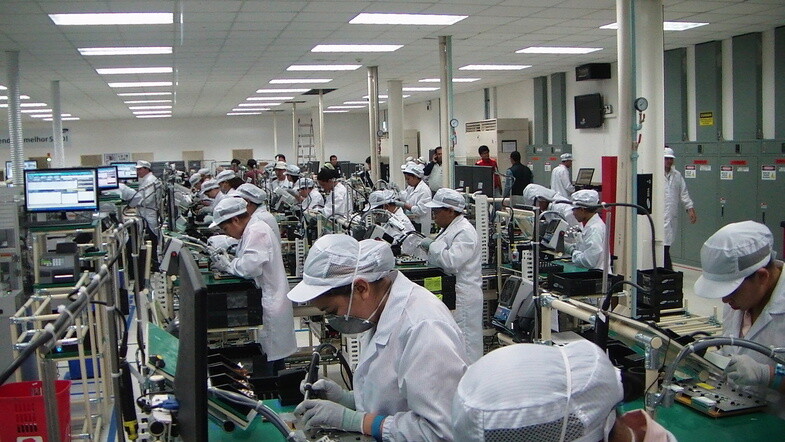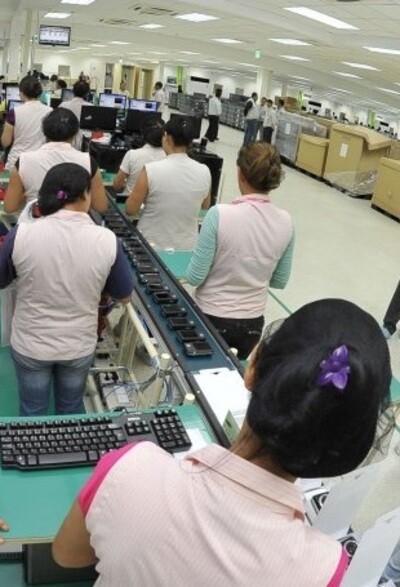hankyoreh
Links to other country sites 다른 나라 사이트 링크
[Special report- Part VIII] The Samsung Brazil's labor union case

Samsung Electronics has production factories in Brazil, in the northern city of Manaus and the southern city of Campinas. The factories there are different from Samsung’s others in Asia. To begin with, the Brazilian factories have no electronic displays showing production status and targets in real time, nor do they employ trainees illegally. The sort of hassles that lead to overwork in South Korea – exemplified by indiscriminate assignment of overtime and the so-called “ppalli ppalli” (“quickly, quickly”) working culture – are seldom found. What accounts for the difference in working conditions are the different labor laws and the power held by workers.
Samsung Electronics’ expansion into Brazil began in earnest in 1995 with the establishment of a 6,000-employee mobile phone factory in Manaus. In 2004, another factory at a slightly smaller scale was built in Campinas for home appliances. Most of the products Samsung sells in the South and Central American markets are made there.
As recently as the early 2010s, working conditions at the Samsung Electronics factories in Manaus and Campinas were not much different from those at Asian factories. There too, a controversy erupted between 2011 and 2013 over long working hours, verbal and physical harassment by South Korean supervisors, and the threat of unjust dismissal.
The first incident occurred at the Campinas factory in November 2011. A number of workers on the Samsung Electronics production line went to the Ministry of Labor to demand improvements to the harsh working conditions. They claimed to have been victimized by the supervisors’ unreasonable production targets, the resulting high-intensity labor and verbal abuse, and the failure to observe break time requirements.
Brazil’s Labor Public Prosecutor (MPT) indicted Samsung Electronics for violating labor law. The case went to court, ending when Samsung donated 500,000 reais (around 330 million won, or (US$279,652, based on the exchange rate at the time) to a regional social welfare fund. The electronic displays placed in the factories to show production status and increase working speed soon disappeared.
In August 2013, a similar episode occurred at the Manaus factory. An MPT investigation uncovered issues with high worker demands and long working hours – amounting to as much as 15 per day. Workers were given just one 10-minute period to rest outside the factory. In some cases, illegally employed dispatch workers were found to be performing duties that should have been assigned to regular workers.
The MPT initiated a large-scale public civil suit demanding damages of 250 million reais (around 120 billion won, or US$101.69 million) from Samsung Electronics. Fifteen days later, a Brazilian labor court ordered Samsung to immediately stop assigning working hours in excess of 10 per day and illegally employing dispatch workers.
The public civil suit against Samsung, with its demands for an enormous sum in damages, was concluded in December 2014 when Samsung entered into a “Conduct Adjustment Agreement” (TAC) with the Brazilian government.
The following year, the MPT announced on its website that in addition to the TAC, Samsung had donated a total of 10 million reais (4.8 billion won, or US$4.07 million) to a local social welfare fund and advertising campaign on worker rights protections. Samsung also had to promise the Brazilian government that it would not engage in any other workplace actions that infringed on worker human rights and dignity.
Conditions for Brazilian workers have improved since prosecution

An investigation report published in December 2017 by the Brazilian labor group Reporter Brasil and the European NGO Center for Research on Multinational Corporations (SOMO) suggested that working conditions at the Samsung Electronics factories in Manaus and Campinas have substantially improved since then. In a report titled “Labor conditions at foreign electronics manufacturing companies in Brazil,” the two groups said a 2015 study found none of the excessive overtime demands or harassment by South Korean supervisors that had been issues at Samsung Electronics between 2011 and 2013.
In an email interview with the Hankyoreh, Andre Campos, a researcher with Reporter Brasil who took part in the study, explained, “The 2014 agreement between the Brazilian government and Samsung Electronics has had a positive impact in terms of subsequent improvements to working conditions at Samsung factories.”
The improvements seen in working conditions at Samsung Electronics’ Brazilian factories in the wake of several outcries owe themselves primarily to active government involvement – and the labor laws that made that possible. While some controversy arose in 2017 over claims that Brazilian labor laws were being changed for the worse, they are still viewed as worker-friendly. The MPT and labor courts are not institutions that exist in South Korea. Workers often take legal action against infringements of labor rights by employers. They may also file suit free of charge if they make below a certain level of income.
Another major force in improving conditions for Samsung factory workers has been the powerful strength and high organization rate of labor unions. Many of the Samsung Electronics workers in Manaus and Campus are active in regional metalworker unions; Brazil is one of the few places in the world where Samsung workers are relatively free to engage in union activities. The unions have taken action in response to insecure employment and falling wages at the Samsung factories.
In an interview with the Hankyoreh, Irene Schipper, a senior researcher with SOMO who took part in a study on working conditions at Samsung Electronics’ Brazilian factories and another in 2012 on the company’s factory in Hungary, said working conditions at “global Samsung” varied with the labor laws and standing of unions in different countries.
“Our conclusion is that Samsung Electronics is less interested in complying with international norms such as UN guidelines on multinational companies, and far more interested in achieving its ‘low-cost model’ while meeting the standards of different countries’ labor laws,” she said.
“So long as the local government permits the low-cost model, we anticipate Samsung will casually disregard the ‘global standard’ for worker right protections.”
Necessity of unions in Samsung factories
Indeed, SOMO’s research findings showed that at the time of a 2012 study, a flexible working time system in four-months units – called a “time bank” – was being operated at Samsung Electronics’ factory in Hungary. Compensation for overtime is offered not through payment, but through shorter hours at times of lower demand. This has had the result of reducing wages. In Hungary, flexible working hours can be introduced at the employer’s direction without the consent of a worker representative. The unionization rate is low – around 8–9% – and few workers enjoy the protections of collective agreements. In May 2018, the European Commission observed that Hungary’s social dialogue structure and process “remained at a regressive level.”
“Some issues with working conditions were still found [in the 2015 study], but Brazil was clearly different from other countries where Samsung operates,” said Schipper.
“The Brazilian factories are among the few Samsung factories anywhere in the world where workers are represented by unions,” she added.
This suggests that improving the harsh working conditions commonly found at Samsung Electronics factories around the world – including low wages, long working hours, and uncertain employment – will require both the commitment of individual countries and practical guarantees on freedom of association for workers. Referring to the poor working conditions at Samsung factories in Asia, Fahmi Panimbang, director of the Indonesian labor group LIPS, said, “Denied unions, Samsung workers have no means of collectively protesting these issues.”
“If unions existed at Samsung’s factories in Asia, workers would have been able to create an environment for promoting and protecting their own minimal rights,” he said.
By Choi Seong-jin, staff reporter
Please direct comments or questions to [english@hani.co.kr]
Editorial・opinion
![[Column] Season 2 of special prosecutor probe may be coming to Korea soon [Column] Season 2 of special prosecutor probe may be coming to Korea soon](https://flexible.img.hani.co.kr/flexible/normal/500/300/imgdb/original/2024/0426/3317141030699447.jpg) [Column] Season 2 of special prosecutor probe may be coming to Korea soon
[Column] Season 2 of special prosecutor probe may be coming to Korea soon![[Column] Park Geun-hye déjà vu in Yoon Suk-yeol [Column] Park Geun-hye déjà vu in Yoon Suk-yeol](https://flexible.img.hani.co.kr/flexible/normal/500/300/imgdb/original/2024/0424/651713945113788.jpg) [Column] Park Geun-hye déjà vu in Yoon Suk-yeol
[Column] Park Geun-hye déjà vu in Yoon Suk-yeol- [Editorial] New weight of N. Korea’s nuclear threats makes dialogue all the more urgent
- [Guest essay] The real reason Korea’s new right wants to dub Rhee a founding father
- [Column] ‘Choson’: Is it time we start referring to N. Korea in its own terms?
- [Editorial] Japan’s rewriting of history with Korea has gone too far
- [Column] The president’s questionable capacity for dialogue
- [Column] Are chaebol firms just pizza pies for families to divvy up as they please?
- [Column] Has Korea, too, crossed the Rubicon on China?
- [Correspondent’s column] In Japan’s alliance with US, echoes of its past alliances with UK
Most viewed articles
- 1‘We must say no’: Seoul defense chief on Korean, USFK involvement in hypothetical Taiwan crisis
- 2[Column] Season 2 of special prosecutor probe may be coming to Korea soon
- 3N. Korean delegation’s trip to Iran shows how Pyongyang is leveraging ties with Moscow
- 4Korea sees more deaths than births for 52nd consecutive month in February
- 5Amnesty notes ‘erosion’ of freedom of expression in Korea in annual human rights report
- 6[Reportage] On US campuses, student risk arrest as they call for divestment from Israel
- 7[Editorial] New weight of N. Korea’s nuclear threats makes dialogue all the more urgent
- 8‘Weddingflation’ breaks the bank for Korean couples-to-be
- 9[Column] Has Korea, too, crossed the Rubicon on China?
- 10[Column] Park Geun-hye déjà vu in Yoon Suk-yeol